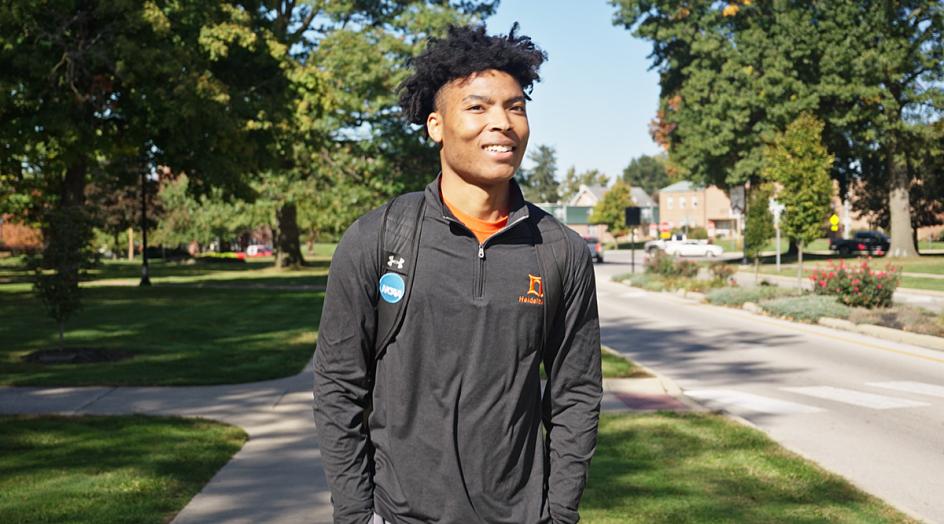
This feature article, written by Ryan Scott, appears on D3hoops.com.
“It’s in the low 30s,” says Heidelberg junior guard, Isaiah Young, when asked how much time he spends each week focused on his primary non-academic pursuit.
That might not sound too extreme for most Division III basketball players — two hours of practice, six days a week, another two hours a day in the gym or getting up shots or traveling to games.
Young’s basketball preparation, however, comes on top of these 30-plus hours he spends representing his classmates and supervising activities as Heidelberg’s student body president.
It’s not unusual for Division III athletes to be involved in a variety of pursuits. The Division III model is built on student-athletes, with limitations on practice and contact hours specifically designed to allow the freedom for foreign travel, clubs and activities, or student government. Division III wants well-rounded students who play sports.
There are plenty of elected officers who also suit up for a Division III basketball team, but it’s relatively rare for that person to have been OAC Rookie of the Year or, as Young is this season, the leading scorer on a nationally competitive team. The time and effort required to excel at the highest level of the sport usually means sacrificing some aspect of the college experience, at least a little bit.
“Isaiah is extremely goal-oriented,” notes Heidelberg president Robert Huntington, who spent decades in business before transitioning to his current role. “He is intelligent, kind, and humble; and his competency for moving people and things to a better place is rare in people of any age, let alone a 20-year-old college student.”
Young led the team in assists last year and was second as a freshman, but has transitioned to more of a scoring role this season as Tre Watkins returned from injury and Heidelberg is replacing a number of players who graduated.
“I use the same mindset on the court as in student government,” says Young, “I won’t ask anyone to do anything they haven’t seen me do. Example outweighs vocal leadership, but that does come later.”
Young is vocal, but also pragmatic — using his student government platform to “spend student money on students.” It’s a good place for any elected leader to be, sitting on a surplus of cash after several COVID years when they couldn’t sponsor activities. “We asked students what activities they wanted and then we’re going to sponsor them.”
Even in this, Young’s collaborative nature shines through. They’re planning joint activities with Tiffin University, the other school in town, and pushing for OAC-wide events to bring students together. He’s also spurred diversity initiatives on campus and created a representative position specifically for student-athletes, to close the gap that occasionally exists between athletes and the rest of the student body.
“I’m sure I’m unique because of my position,” notes Young. “But I attend as many plays and concerts as I can and encourage other athletes to do the same. Those students show up to support basketball.”
Adds Huntington: “Isaiah is always in team mode. That’s a core value. Either you believe in bringing people together or you don’t. He does.”
So far, so good, on the court. Heidelberg is perhaps the most overlooked of contenders in the OAC — Marietta has name recognition while Mount Union and John Carroll return largely intact, proven rosters from last season — but that suits Young and company just fine. Sitting in a second-place tie with Mount Union entering play on Jan. 17, the Student Princes are always happy to put their heads down and get to work.
Work is something with which Young is already quite familiar. Despite all the demands on his time, Young is on pace to graduate with a triple major in political science, economics, and criminology. “There’s a lot of overlap,” he notes, “So I can get it all done in four years.”
Isaiah Young is just one example of the exceptional student-athletes who exist all over Division III. While there are certainly hoopers who are primarily in school to play ball, that’s certainly less prevalent than at other levels. Huntington has perspective on this, too.
“As a naive second-year college president, I went to the bathroom during an OAC meeting and found myself appointed as representative to the NCAA, where I served in several capacities, including five years on the President’s Council. Interacting with the national SAAC [Student Athletes Advisory Committee] I discovered there are dozens of Isaiahs out there.
“It doesn’t matter where they come from, east/west, black/white, badminton/football, rural/urban, rich/poor, they have incredible qualifications and represent the breadth and depth of Division III student-athletes. They are not paid to play here; they choose to be here. They excel academically, they engage their passions. Isaiah might be in the top 1% in terms of ability and achievement, but there are so many like him out there.”
Back on Earth, Young interned for Sherrod Brown, Ohio’s senior U.S. Senator, last summer, answering phone calls, talking to constituents, and shadowing a legislative aide. While a fast track to Washington might be doable after graduation, Young’s current plans involve heading home to Akron to serve in local government and make a difference in his community. (I sure hope another basketball-playing, community-minded Akron native takes note.)
Isaiah Young stands in for and represents the exceptional students and leaders driving your favorite team and preparing for wider leadership in the future.
After all, they are precisely what Division III basketball is all about!